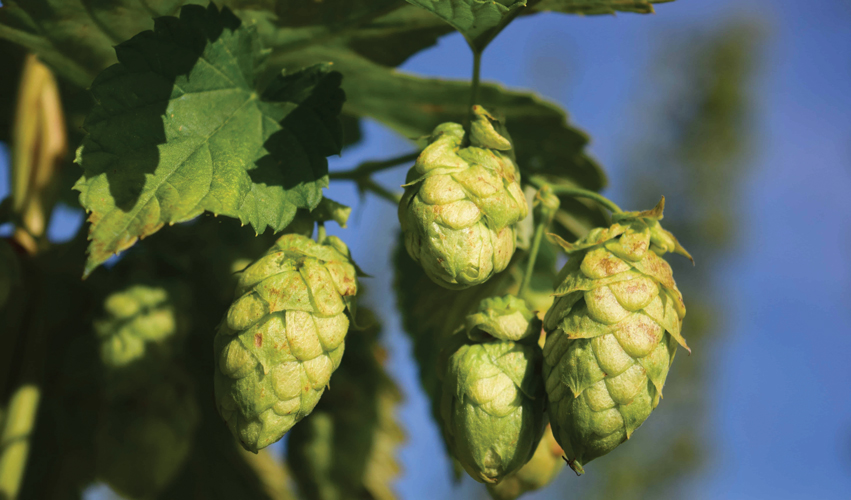Tapping the Hops Market

As it connects the craft brew craze with the local foods movement, Hallowed Hops Co. is proving there’s more to agriculture than corn and soybeans.
Located south of Lewistown on U.S. Route 36, Hallowed Hops began as an experiment in 2014 when the Kotewa family planted a trial run of hops on two acres of their farm. What started as a hobby has developed into a full-time enterprise, prompting Erik Kotewa to leave his job as an economic developer for the Champaign County Economic Development Corporation in 2016. The Kotewas’ hop yard now covers 10 acres of their 309-acre farm, and Erik’s brothers Aaron and Caleb, parents Larry and Julie, and wife Jamie all contribute to the endeavor.
Growing, Harvesting and Processing
Hops are used primarily in beer brewing to add varying degrees of bitter or citric flavor and scent (most prominently in India pale ales) and as a stabilizing agent. Kotewa describes it as a fascinating but challenging plant to cultivate successfully, and establishing the hops yard has been quite a learning process. They grow several different varieties—with names like Centennial, Crystal, Cascade, Cluster, Chinook, Nugget and Alpha Aroma—and they all have different growing specifications. “Each variety has a different bittering value and aroma,” Erik explains, “and each needs a different kind of love in the field.”
The hops plant grows as a vine, so the Kotewas built a system of 20-foot trellises for the crops to climb. Trellis maintenance can be problematic, requiring the use of a telehandler and an elevated platform on wheels to “string the yard.” This year they’ll be tying 20,000 strings and “training” 40,000 vines, helping them find the twine in order to grow vertically.
Harvesting, drying and processing hops is time- and labor-intensive as well. Hops are picked when the flowers are mature and the aroma and alpha acids are at peak levels. Three to four people move with the picking trailer, cutting the whole vine out of the field and stacking them on. Then the vines are fed through a stationary picker at a rate of 180 vines per hour (picking by hand can take up to an hour per plant).
The flower, or cone, of the plant is about 80 percent water, so once picked, they must be dried to prevent spoilage. They are dried in batches at 100° F for about 20 hours, and then processed into pellets. Most brewers’ equipment can’t process whole cones, so hops are sold as pellets in mylar flushed with nitrogen. “Even the pellet mill is nitrogen-flushed to prevent oxidation of the hops oils,” Kotewa adds. “They must be freezer-stored because heat, sun and oxygen are the enemies.”
Yield per acre can range from 1,200 to 2,000 pounds, with beer requiring anywhere from six ounces to three pounds of hops per barrel. While hops can procure more revenue per acre than commodity crops, the initial investment is substantial ($15,000 to 20,000 per acre), and it takes several years for most farmers to break even.
A Unique (and Growing) Marketplace
One perk of the hops business is being able to enjoy the fruits of one’s labor in a cold beer. In addition to providing samples to breweries so they can experiment with flavor, the Kotewa family brews their own home batches. Erik is currently partial to a Crystal/Cluster blend. “This particular hops combination makes my palate tingle,” he says. “It creates a floral/fruity/citrus earthiness with a delicious melon backdrop.”
Hallowed Hops sells its product directly to breweries—although finding local buyers can be difficult for farmers new to the market. “Brewers [prioritize] quality before ingredient location,” Erik notes. “Great hops are already available from the Pacific Northwest, so breaking into the market requires trial by brewers and a willingness to change sources.”
The Kotewas overcame that hurdle, having formed relationships with breweries throughout Illinois. Beer enthusiasts can taste their Hallowed hops at Industry Brewing Co. and Bearded Owl Brewing in Peoria, Destihl Brewery in Normal, as well as breweries in Springfield, Savoy, Geneseo, Paris, and Chicago. Hand of Fate Brewing Company in Petersburg is even making its 1818 Illinois Bicentennial Beer with Hallowed hops this year.
The abundance of new breweries popping up in central Illinois shows the brewing craze isn’t slowing down anytime soon. According to the Brewers Association, 2017 was another record year for the industry, with more than 6,000 breweries contributing $67.8 billion to the U.S. economy. More beer means an increased demand for hops, and the Hop Growers of America reports that hops acreage has jumped 79.5 percent since 2012. Last year was another record year for hops production, with 87.1 million pounds of the crop valued at $618 million, according to the USDA National Hop Report. Hallowed Hops remains just one of a handful of hops farms in Illinois, but more farmers are starting to experiment with hops every year.
Erik cautions anyone considering hops farming to take time to talk to growers and brewers and do extensive research before hopping on the bandwagon. “There’s no shortage and they’re hard to grow,” he warns. “Being unique in the hops market takes lots of experience and then seven to 14 years if you get lucky.” Getting to where they are now involved a lot of trial and error—he lists crop disease, too much heat, too little rain, irrigation pumps burning up, trellis breaks and repair, and Japanese beetles among the setbacks they’ve encountered.
But the Kotewas have big plans for the 2018 season: they’re adding a five-acre expansion, aiming for a 10,000-pound yield, and seeking more opportunities with local breweries. Erik and another partner have also founded Illinois Hops LLC, a new business that will focus on processing hops and collaborating with other Illinois hops growers. With a little luck and a lot of hard work, Hallowed Hops will continue providing high-quality, locally-grown hops to Illinois’ flourishing craft beer market. iBi
Visit hallowedhops.com for more information.

